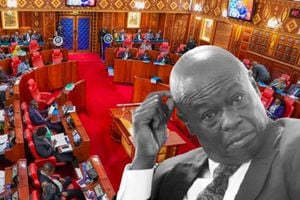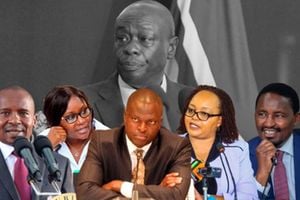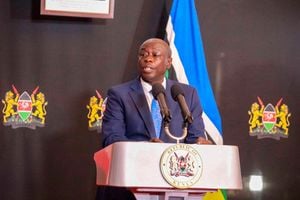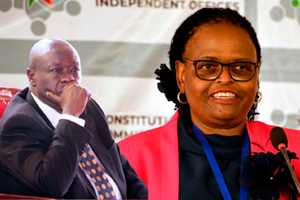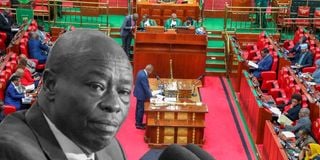
Kibwezi West MP Mutuse Mwengi tabling his impeachment motion against Deputy President Rigathi Gachagua (inset) at the National Assembly in Nairobi on October 8, 2024.
Parliament is sharpening its arsenal in a seven-point strategy to scuttle the case by Deputy President Rigathi Gachagua challenging his impeachment by the National Assembly.
Mr Gachagua has told the court that the National Assembly conducted a sham public participation prior to passing the impeachment motion on October 8 and on that ground alone, the ‘purported ouster’ is null and void.
Through his lawyer Paul Muite, the DP argues that the impeachment motion voted for on Tuesday by 282 MPs, does not meet the threshold as set by Article 145 (1).
As it is, public participation done last week on Friday and Saturday is turning out to be the cornerstone of the DP argument in court, which is seeking to stop the Senate from debating the outcome of the process.
The bulk of the National Assembly strategy, according to documents seen by Nation.Africa, is to deflate the DP’s pushback. It addresses the public process where the House is arguing that despite the limited time of seven days, as provided in the constitution, it conducted comprehensive public participation as provided for in Article 118 of the constitution.
In the document seen by the Nation, the House in its first strategy argues that the masses were invited to give views on the impeachment motion through public hearings conducted in all 290 Constituencies and 47 Counties and also through submission of memoranda.
The National Assembly says it sensitised the public in print and electronic media on the impeachment Motion and invited the public to submit views.
“Thereafter, for two consecutive days and in compliance with directives of the court to extend public participation, the National Assembly conducted public hearings in all 290 constituencies and 47 Counties and received public views from across the country,” the National Assembly says.
The National Assembly says the public hearings involved a detailed sensitisation of the public on the contents of the special motion before the House.
Special motion
“The Public Views forms which contained the grounds in summary for ease of understanding by the public and the special motion which contained all the grounds in detail, were made easily accessible to the public through print form and electronic medium,” reads the document.
The House argues that the public views forms and special motions were made available to the public in both English and Kiswahili and in some stations, the local language was used where the public demanded further explanation.
The National Assembly also argues that the Deputy President was given an opportunity to be heard both in person and or through legal representatives in accordance with the requirements of Articles 47 and 50 of the Constitution on fair hearing and fair administrative action
Further, the House says all the service documents in relation to the impeachment motion were made available to the Deputy President and adequate notice was given to him to prepare a response in accordance with the rules of natural justice.
The National Assembly says Mr Gachagua was also allocated a maximum of two hours to present his case to the House without interruption.
Mr Gachagua has argued that he was not afforded adequate time in the House to respond to the 11 allegations contained in the impeachment motion.
In strategy number two, Parliament is seeking to exploit the press conference Mr Gachagua had on Monday, a day before facing MPs where he prosecuted his case in the media contrary to Standing Orders.
“Despite the House rules against the anticipation of debate and the court sub-judice rule which from practice would have also applied in this case, requiring the Deputy President to exercise restrain not to argue the merit and demerits of the case before the Motion was considered in the House, the Deputy President on Monday, October 7, 2024, held a press interview where he argued his defence case,” Parliament says.
In the address, Parliament says the DP admitted liability to some of the grounds contained in motion as grounds for his ouster. However, the House did not raise or use it against him when he appeared before MPs on Tuesday.
The National Assembly on the third strand of defence has video evidence of how some elected MPs, two former Members of the County Assembly and a former governor disrupted the public participation exercise thereby giving the locals an opportunity to express themselves on the motion.
In possession of the National Assembly is evidence of an MP who ordered the closure of the office where the exercise was to take place and later complained that the place remained closed hence the public was locked out.
The National Assembly, in a strongly worded letter seen by the Nation, told the MP there was no legitimate reason to close the office and order staff not to appear yet the operations of the office are fully financed by the Parliamentary Service Commission which also pays the staff working there.
In Nyandarua, Parliament will demonstrate how some leaders turned up at the public participation venue and beat up those who were peacefully signing the motion and tore the papers.
In Kiambu, two former MCAs are in soup after they turned up at the venue of the exercise and started conducting a rally campaigning against the sitting MPs by using the ready crowd that turned up for public participation thereby putting the entire exercise into disarray.
A former governor also turned up with goons who harassed the parliamentary staff and members of the public who were filing the forms.
“There exists cogent evidence to show calculated attempts at disrupting the public participation exercise. However, the National Assembly ensured that the process was meaningful and effective despite the prevailing disruptive threats,” reads the document.
In its number four argument, the National Assembly is putting forth a case on the principle of separation of powers pointing that courts have ruled before on the need not to interfere with the authority of Parliament until a final decision is made by Parliament on an issue in question.
In its fifth argument, the National Assembly says it’s premature for the Deputy President to go to court yet the impeachment process is not complete as the matter is still before the Senate which is the trial chamber where he will have an opportunity to cross-examine witnesses line up against him and poke holes on other evidence provided by the sponsor of the motion Mwengi Mutuse (Kibwezi West).
“Any court intervention when the matter is pending before the Senate would be a departure from the rule on non-interference and separation of powers,” the National Assembly says.
According to the National Assembly, the place or import of the public participation process in quasi-judicial proceedings should be questioned as impeachment relates to a question of liability and culpability which is devoid of public opinion.
Sixth strategy
Under its sixth strategy, the National Assembly argues that the question of impeachment is one that substantively touches on integrity and one which the court should be reluctant to interfere with as only Parliament can determine in substance whether to impeach a state officer or not.
This argument has, however, been subject in most social media spaces where the former Law Society of Kenya chairman Nelson Havi also said there is no judicial intervention on the impeachment of the Deputy President.
“Rigathi Gachagua will cease being DP on the vote of the Senate. Unlike the removal of a judge which can be appealed to the Supreme Court, impeachment of the President and DP is final and incapable of challenge. The constitution did not contemplate judicial intervention on impeachment,” Mr Havi posted on his X account.
In its last seventh strategy meant to counter the argument by the Deputy President's assertions that the forms of public participation that were circulated to the public ought to have contained his response, the National Assembly says the response of the DP was not a subject matter in the House.
“The matters subjected to public participation is the business of the House in this case the impeachment motion in terms of Article 118. The response of the Deputy President was not a subject of public participation,”

